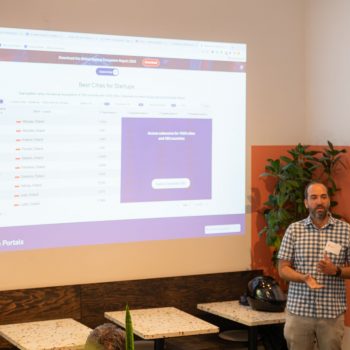Startup Ecosystem Research is a strategic activity to conduct for ecosystem growth, policy formulation, and infrastructural development. It encompasses a thorough analysis of various elements from investment trends to the roles of stakeholders like startups, coworking spaces, accelerators, and the overall business environment. An example of this is the Global Startup Ecosystem Index Report, published annually by StartupBlink, is an in-depth analysis of startup ecosystems by using dozens of parameters that defines the performance of 1,000 cities and 100 countries in the world.
If you’re looking to conduct a Startup Ecosystem Research tailored for your needs, contact us.
Understanding the Startup Ecosystem
The term “startup ecosystem” refers to the network of interactions between startups, investors, service providers, and government entities. These interactions create an environment that can either foster or hinder the growth and success of startups. You can learn more about the best cities to relocate for startups in 2023 in this article.
How StartupBlink helps on Startup Ecosystem Research?
StartupBlink’s methodology for analyzing startup ecosystems is underpinned by a framework that encompasses over 40 parameters. The platform’s research capabilities covers more than 1,000 cities, 100 countries, alongside a deep dive into the data of approximately 150,000 startup entities across 12 industries and 100+ subindustries, available on the Global Startup Ecosystem Map. This expansive reach ensures that StartupBlink’s analysis is not only detailed but also globally representative.
Quantity Score: Measures the ecosystem’s vibrancy based on the quantity of startups, coworking spaces, accelerators, and startup-related meetups. It utilizes global data sources, including CrunchBase, to gauge activity levels and stakeholder participation within the ecosystem.
Quality Score: Assesses the ecosystem’s qualitative achievements using metrics like entity traction (traffic, domain authority, customer base), the presence of strategic branches or R&D centers of major tech corporations, investment data, and the influence of global startup events. Data from Semrush and CrunchBase helps evaluate the overall quality of each ecosystem.
Business Environment Score: Focuses on national infrastructure, policies, and laws affecting startups. This includes considerations of internet speed, R&D investment, technological services, English proficiency, passport strength, and startup-friendly legislation. This score also accounts for city-level activity variations within the same country.
Learn the details of How to Measure Startup Ecosystem Success?
Benefits of Startup Ecosystem Research for the Private Sector
Identifying Market Opportunities
Private sector entities leverage Startup Ecosystem Research to pinpoint emerging market opportunities, especially valuable for businesses integrating innovation into their business models or managing innovation programs.

Strategic Market Insight: Startup Ecosystem Research offers private sector entities invaluable insights into new and emerging market trends. This information is crucial for companies seeking to integrate innovative approaches into their business strategies for managing innovation-focused programs.
Discovering Untapped Markets: By analyzing startup ecosystems, companies can uncover untapped market niches and emerging consumer needs. This ability to identify less obvious but potentially lucrative opportunities can be a game-changer for businesses looking to stay ahead in competitive industries.
Targeting High-Potential Sectors: The research aids in identifying sectors with high growth potential, enabling companies to focus their investment and innovation efforts where they are most likely to yield significant returns. For example, based on our research, Software & Data is the largest industry for startups with more than 30% share.
Facilitating Business Expansion
For companies aiming to expand, understanding the existing infrastructure of startup ecosystems is vital. This research helps in identifying infrastructure gaps, enabling businesses to plan effectively for expansion and facility development.
Understanding Infrastructure Dynamics: Gaining insights into the infrastructure of various startup ecosystems is helpful for businesses planning expansion. This knowledge helps in identifying locations with the necessary facilities and support systems conducive to their operational needs.
Startup Program Assessment: Through StartupBlink’s expertise in startup ecosystems, as well as its proprietary data, private sector organizations can assess the effectiveness of their startup program.
Planning for Expansion: The research helps businesses identify infrastructure gaps, enabling them to plan effectively for geographical expansion and facility development. This is particularly relevant for businesses seeking to establish a physical presence in growth-oriented ecosystems.
Benefits of Startup Ecosystem Research for the Public Sector
Shaping Government Policies
Governments can use Startup Ecosystem Research to develop policies that encourage innovation and economic growth. The insights gained from this research guide the creation of supportive environments for startups, including regulatory frameworks, tax incentives, and support programs.
Tailored Policy Development: Governments leverage Startup Ecosystem Research to craft policies that foster innovation, driving economic growth. This research provides critical insights into startups, helping policymakers understand the unique challenges and opportunities within the ecosystem.
Incentivization Strategies: The data from Startup Ecosystem Research assists in developing targeted incentive programs, such as tax breaks and grants. These incentives are essential in nurturing a conducive environment for startups, making it easier for emerging businesses to thrive and innovate.
Regulatory Framework Optimization: The research offers a deep dive into the regulatory challenges faced by startups. This understanding enables governments to streamline or modify existing regulations, reducing bureaucratic hurdles and fostering a more startup-friendly regulatory landscape.
Informing Infrastructure Development
StartupBlink’s data is a valuable resource for governments planning infrastructure development initiatives, such as innovation hubs and technology parks. By pinpointing areas with high startup activity, governments can make informed decisions on where to invest in facilities that support various startup sectors.
Strategic Infrastructure Placement: Utilizing insights from sources like StartupBlink, governments can strategically plan and invest in infrastructure that supports startup ecosystems. This includes the development of innovation hubs and technology parks in regions with high startup density.
Startup Program Assessment: Through StartupBlink’s expertise in startup ecosystems, as well as its proprietary data, governments can assess the impact of a startup program on the development of their ecosystem to make infor
Catalyzing Regional Growth: By focusing infrastructure development in areas identified through research, governments can stimulate regional economic growth. This targeted approach not only supports startups but also attracts further investment and talent to the region.
Cross-Sector Synergies: The research helps in identifying key sectors within the startup ecosystem, enabling the development of specialized facilities, grant programs and accelerators focused on those industries. Such initiatives cater to specific industry needs, fostering synergies among startups, research institutions, and larger corporations.
Enhancing Talent Development
Governments can utilize Startup Ecosystem Research to design education and training programs that align with the evolving demands of the startup industry. Identifying needs in emerging sectors enables the creation of educational programs that ensure a skilled workforce to support the ecosystem.
Alignment with Industry Needs: Startup Ecosystem Research provides insights into the evolving skill requirements of the startup sector. Governments can use this data to tailor educational and training programs, ensuring they meet the current and future needs of the industry.
Fostering a Skilled Workforce: By identifying gaps in the existing talent pool, governments can introduce initiatives to cultivate the necessary skills. This includes specialized training programs, scholarships, and partnerships with educational institutions, creating a pipeline of skilled professionals for the startup ecosystem.
To Sum Up,
Whether for strategic planning, policy development, or infrastructure investment, this research provides the insights needed for informed decision-making and strategic growth. To harness the full potential of your startup ecosystem and drive innovation, consider conducting specialized Startup Ecosystem Research with the expertise and data provided by StartupBlink. To conduct a startup ecosystem research for your organization, contact us today.








